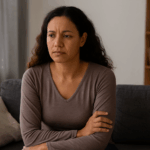Starting the divorce conversation is often one of the most emotional and difficult parts of the entire process, especially if you are unsure how your husband will react. Fear, uncertainty, and the weight of shared history can make it challenging to find the right words and the right moment.
This guide offers compassionate and practical divorce advice for women in South Africa, helping you prepare emotionally, choose the right setting, communicate your decision with clarity and respect, and ensure your safety. Whether you are feeling afraid, conflicted, or simply ready to move on, the goal is to help you approach the conversation with dignity, safety, and a clear plan.
1. First, Assess Your Safety
Before planning how to tell your husband you want a divorce, it is important to be honest with yourself about your safety. The approach will be very different depending on whether your marriage is abusive or not.
If You Are in an Abusive Marriage
If you have experienced physical, emotional, or psychological abuse, the first priority is protection, not conversation. In such cases, it may not be safe to initiate the divorce discussion at home when it is just the two of you.
- Seek a Protection Order First: Before discussing divorce, apply for a protection order at your nearest Magistrates’ Court. Ensure that at least an interim protection order is granted before you take any further steps. This will give you legal protection, even if the final order is still pending.
- Get Legal Advice Early: Consult an attorney before submitting your protection order application. Courts often reject applications not because the abuse did not happen, but because the forms were not completed with enough specific detail.
- Be Clear in Describing the Abuse: Avoid general statements like “my husband is abusive.” Instead, give specific examples of behaviour: “He pushed me against the wall,” “He slapped me across the face,” “He threatened to kill me,” etc. Courts need clear, descriptive accounts to understand the nature and severity of the abuse.
- Do Not Confront Alone: Once you have protection in place, any necessary communication about the divorce can happen in a safe setting — ideally through your lawyer or in a public, neutral location.
If You Are Not in an Abusive Marriage
If there is no abuse and you believe the conversation can be handled respectfully, consider the following approach:
- Schedule a Mutual Legal Consultation: Arrange a meeting with an attorney where both you and your husband are present. This attorney will act as a neutral facilitator, explaining each of your rights and outlining the divorce process.
- Aim for an Unopposed Divorce: If you can agree on key issues like property division, child care, and maintenance, the process can be quicker, less costly, and far less stressful.
- Remain Aware of Impartiality: If either of you begins to feel that the “mutual” attorney is favouring one side, the other spouse should seek independent legal advice. You can still proceed on an unopposed basis, but with separate representation.
- Agree on Parenting and Settlement Plans Early: Before issuing summons, you can draft a mutually agreed parenting plan (covering primary residence, contact arrangements, and responsibilities) and a settlement agreement (covering finances, property division, and maintenance). Having these in place early helps make the court process much smoother.
2. Choosing the Right Time and Setting
If it is safe to speak directly to your husband about divorce, choose a time and setting that allows for a calm and focused conversation. Avoid high-stress moments, such as during arguments or important family events. A neutral space where both parties feel safe and comfortable can make it easier to speak openly.
3. Communicating Your Decision with Clarity and Respect
Approach the conversation with honesty and firmness. Be clear that you have made your decision, but avoid unnecessary blame or personal attacks. Explain that you want to move forward in a way that is as respectful and constructive as possible, especially if children are involved.
4. Thinking Ahead: Parenting, Property, and Maintenance
While the initial conversation may focus on your decision to divorce, it is wise to start thinking about the practical implications:
- Property: Your matrimonial property regime will determine how assets and debts are divided.
- Children: In South Africa, the court prioritises the best interests of the child. In many cases, a mother who can provide a safe and stable environment will be awarded primary residence, but fathers will still have rights of contact unless this would be harmful to the child.
- Maintenance: You may be entitled to claim spousal maintenance, depending on factors such as earning capacity, standard of living during the marriage, and contributions made.
Final Word
Telling your husband you want a divorce is rarely easy, but having a plan — and ensuring your safety if abuse is involved — can make a world of difference. Whether you approach the conversation with legal protection already in place or in a mutual consultation setting, the goal is the same: to move forward with clarity, dignity, and confidence.
If you are unsure where to start, speak to a divorce lawyer for women who can guide you through your options and help you protect your rights at every stage.





